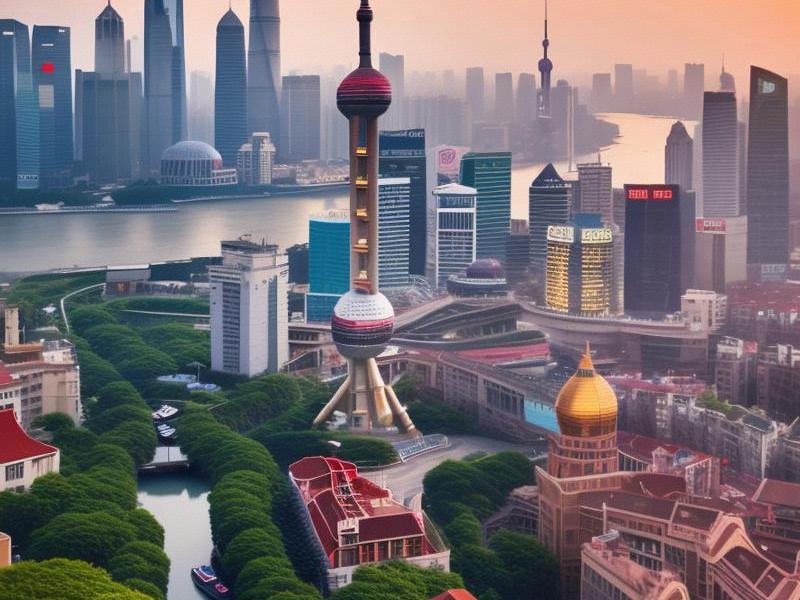
Shanghai, the bustling financial center of China, is a city that seamlessly blends the old with the new. Its skyline, dominated by the iconic Oriental Pearl Tower and the futuristic Shanghai Tower, is a testament to its rapid urban development. However, Shanghai's story is not just about its own growth; it is deeply intertwined with the surrounding areas that contribute to its prosperity.
The Yangtze River Delta region, which includes Shanghai, Suzhou, Hangzhou, and Ningbo, is one of the most economically active areas in China. This region has been a cradle of Chinese civilization for thousands of years, with a rich history of trade, culture, and innovation. The integration of these cities has created a powerful economic bloc that drives China's national economy.
Suzhou, often referred to as the "Venice of the East," is renowned for its classical gardens, silk production, and traditional Chinese architecture. The city's intricate canal system and well-preserved ancient towns, such as Tongli and Luzhi, offer a glimpse into China's rich cultural heritage. Suzhou's proximity to Shanghai has facilitated the exchange of ideas, goods, and people, fostering a symbiotic relationship between the two cities.
Hangzhou, the capital of Zhejiang Province, is famous for its breathtaking West Lake, a UNESCO World Heritage site. The city is also a hub for high-tech industries and e-commerce, with Alibaba Group headquartered there. Hangzhou's scenic beauty and technological advancements make it a perfect complement to Shanghai's urban vibrancy. The two cities are connected by the Shanghai-Hangzhou High-Speed Railway, which has further strengthened their economic and cultural ties.
上海龙凤419会所 Ningbo, another significant city in the Yangtze River Delta, is known for its port, one of the busiest in the world. Ningbo's maritime history dates back over a thousand years, and it continues to play a crucial role in global trade. The city's strategic location and advanced infrastructure have made it a key player in China's Belt and Road Initiative. Ningbo's collaboration with Shanghai in areas such as logistics, finance, and technology has enhanced the region's overall competitiveness.
The integration of Shanghai with its surrounding areas is not limited to economic aspects; it also extends to cultural exchanges and shared initiatives. The Shanghai Cooperation Organization (SCO), which includes several cities in the Yangtze River Delta, promotes regional security, economic cooperation, and cultural exchange. This organization exemplifies the collaborative spirit that defines the relationship between Shanghai and its neighbors.
Culturally, the region is a melting pot of traditions and modernity. Shanghai's cosmopolitan atmosphere is influenced by its history as a treaty port, where Chinese and foreign cultures interacted and blended. This cultural diversity is reflected in the city's architecture, cuisine, and arts. The Bund, with its historic buildings and stunning views of the Huangpu River, is a symbol of this cultural fusion.
The surrounding areas also contribute to Shanghai's cultural landscape. Suzhou's classical gardens, Hangzhou's West Lake, and Ningbo's historical sites attract millions of tourists each year, enriching the cultural experiences available to residents and visitors alike. These attractions not only showcase the region's rich history but also serve as platforms for cultural exchange and tourism development.
上海花千坊爱上海 Economically, the integration of Shanghai with its surrounding areas has created a synergistic effect, driving innovation and growth. The Yangtze River Delta region is home to numerous high-tech industries, research institutions, and financial centers. The free trade zones established in Shanghai, Suzhou, and Ningbo have facilitated international trade and investment, making the region a global hub for commerce and finance.
The development of the Shanghai International Airport and the nearby Pudong International Airport has enhanced the region's connectivity, enabling seamless travel and trade. The integration of transportation networks, including highways, railways, and waterways, has further strengthened the economic ties between Shanghai and its neighbors. This infrastructure development has not only boosted the region's economic prospects but also improved the quality of life for its residents.
However, the rapid urbanization and economic growth in the region have also brought challenges. Environmental concerns, such as air pollution and water management, require urgent attention. The governments and stakeholders in the Yangtze River Delta region are actively working on sustainable development initiatives to address these issues. Promoting green technologies, improving waste management systems, and enhancing environmental regulations are some of the measures being taken to ensure a balanced and sustainable future.
上海私人外卖工作室联系方式 In addition to economic and environmental challenges, the region also faces social and cultural challenges. The influx of people from rural areas and other parts of the country has led to issues related to housing, education, and healthcare. The governments in the region are investing in public services and infrastructure to accommodate the growing population and improve the standard of living.
Despite these challenges, the future of Shanghai and its surrounding areas looks promising. The ongoing integration and development efforts are expected to enhance the region's competitiveness and global influence. The collaboration between cities in the Yangtze River Delta will continue to drive innovation, economic growth, and cultural exchange, making the region a model for sustainable urban development.
In conclusion, Shanghai and its surrounding areas form a dynamic and interconnected region that exemplifies the best of China's urban development, cultural heritage, and economic integration. The cities of Suzhou, Hangzhou, and Ningbo, along with the broader Yangtze River Delta region, contribute to Shanghai's prosperity and global significance. The unique blend of tradition and modernity, coupled with a commitment to sustainable development, ensures that this region will continue to thrive in the years to come.
As Shanghai continues to evolve as a global metropolis, its relationship with the surrounding areas will remain a key factor in its success. The collaborative spirit and shared initiatives between these cities will drive innovation, economic growth, and cultural exchange, making the Yangtze River Delta region a beacon of progress and prosperity in China and beyond.
